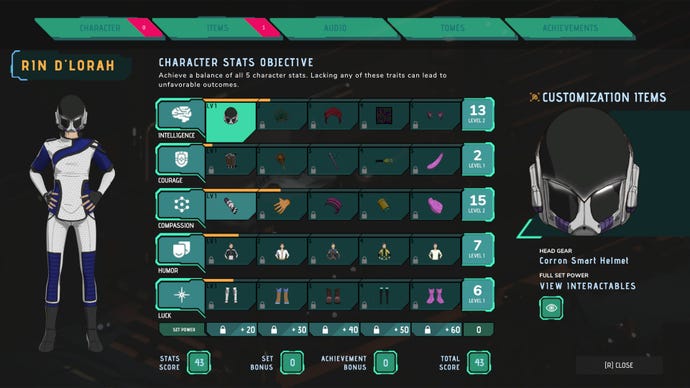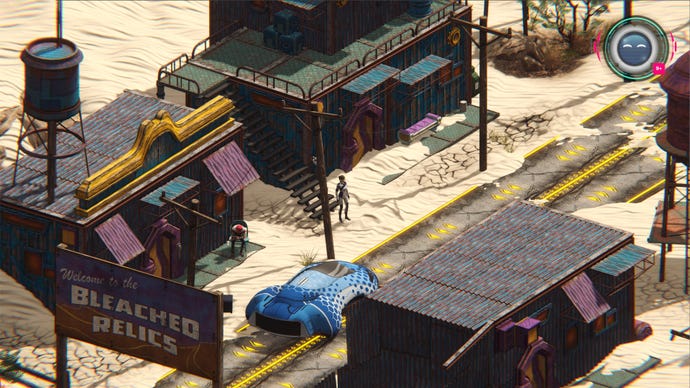HomeFeaturesSky Of Tides
Sky Of Tides is the anti-Disco Elysium in which balance is queenIn this lush sci-fantasy RPG adventure, min-maxing is a sin
In this lush sci-fantasy RPG adventure, min-maxing is a sin
Image credit:ESDigital Games
Image credit:ESDigital Games

Leonardo Da Vinci’sVitruvian Manis a legendary drawing of a nude with his arms and legs reaching towards the rim and corners of a circle and square. It’s often invoked as an archetype for the humanist worldview of Man the Measure and Centre of all Things, holding a perfectly proportioned universe in shape. Rin D’Lorah, the heroine of new narrativeRPGSky Of Tides, is a bit like the Vitruvian Man, and the result is a game I find at once bewitching and powerfully offputting in its refusal to satisfy the conventions of the genre.
Sky of Tides - Announcement TrailerWatch on YouTube
Sky of Tides - Announcement Trailer

Rin’s five character traits are intelligence, courage, compassion, humour and luck, which are increased via dialogue choices and collecting items or equipment of various kinds. In the average RPG, you’re encouraged to concentrate on a couple of stats with a view to a particular playstyle. But in this case, you’re expected to improve them all at an equal rate, so as to not only achieve but model within yourself the reconciliation of the setting’s warring ideologies and energies.
Image credit:ESDigital Games


What happens when the player favours one trait over the other? “One, you won’t unlock things, and then two, in the end, you’re not going to get a favourable outcome,” Cheung says. “So each stat actually is linked to some kind of relationship or some aspect of the world. And if you’re not in balance, maybe like your friend is no longer in your life, your father has died, the chairman who is this authoritarian figure maybe has taken over. So there’s kind of different endings, and if you’re completely balanced, then the player will get a chance to have the worlds come back together.”
There’s a character in Sky Of Tides who guides you through these metaphysical twists and turns, and there are also talking statues throughout Numen that sort of appraise your personal equilibrium in passing, as though X-raying your soul. “Depending on your stats, they’ll say oh, you know you’re really intelligent, but you’re kind of a coward - that kind of thing.” Sky Of Tides is divided up into chapters, and you can replay chapters if you find yourself out of balance. The game also has a “failsafe” feature that resets you a bit if you make a particularly ill-advised decision.
I find Sky Of Tides hypnotic inasmuch as if I understand the game correctly, I suspect I’m going to hate it. I routinely end up playing an all-rounder character in RPGs because I am hopelessly cautious and get ferocious FOMO about progression paths-not-taken, but I do feel that at their most engrossing, RPGs aren’t supposed to be played that way. The point is to doodle in the margins of morality and practical capacity, to bend and twist personalities into keys for a simulation’s worth of mishappen locks.
Won’t there be times, I ask Cheung, where players find it much more satisfying to end up out of balance - flipping to the dark side and all that? “There will be some choices that give you like, access to different people and information about themselves. But in terms of like wanting to become unbalanced, I don’t think we built that into the game - I think we are emphasising the balance.”
Image credit:ESDigital Games

The game’s ideas about balance are pre-existing and imposed, it seems, rather than resulting from any particular set of beliefs and values you might encounter on the road. Rin always knows, on some level, what balance is, however much her experiences shape her. “I think it’s kind of like a meta that’s adjacent to like, her discoveries in the world,” Cheung notes. “She’s always trying to maintain the goodness that has always existed.”
A lot of thought has gone into the metaphysical make-up of Rin and her world, then. But still, I find the game’s emphasis on consolidating the “middle path” perverse. I’m intrigued to compare it with two other RPGs that loom large in my understanding of the genre, and which draw upon their own peculiar philosophical traditions. One is the recentWarhammer 40,000: Rogue Trader, which - as ever with Warhammer - is set in a universe of clownish extremes. There are no True Neutrals in Rogue Trader - the middle path is a foot-wide strip of gouged and bloodied No Man’s Land. I don’t think the writing quite nails it, in hindsight, but trying to walk that path isan enjoyable challengesimply because that’s really not how the setting would have you behave. I’m interested to discover if Sky Of Tides has a similar fraught chemistry: it doesn’t really feel like it, given that Rin is established as a force for good from the outset.
Image credit:ESDigital Games

The other game - the one that is a direct inspiration on Sky Of Tides’s visual presentation, as Cheung acknowledges - isDisco Elysium. ZA/UM’s game has minimal patience for the middle path in RPGs. It associates calls for balance with the privileged creed of centrism, that deceptively wimpy, crushingly civil, quietly draconian call for everybody to just somehow put aside their differences and rub along in an increasingly brutal and unjust world.
The key difference, I guess, is the degree of hope or anguish at work. In Disco, history and reality remain fractured and dispersed whatever road you take, however adroitly you play; in Sky Of Tides, it’s seemingly possible to reach out, compose your limbs against the chaos, and push the universe into its rightful, perfect shape. I know which outlook I have more sympathy for, but they’re fascinating to compare.